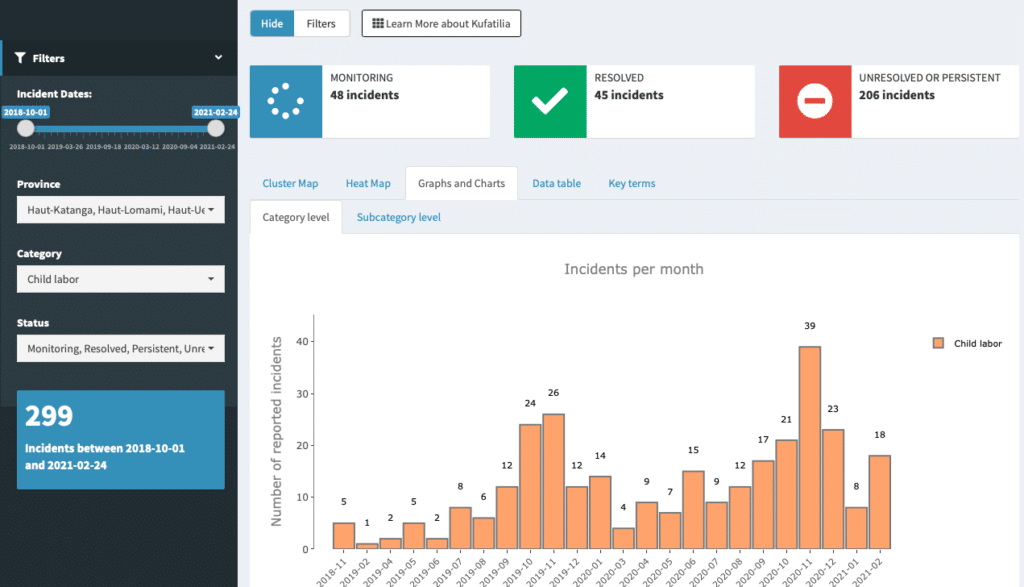The 2021 Stop Slavery Award attributed by the Thomson Reuters Foundation was granted to Ulula for the project Kufatilia, in the category “collaboration”. Kufatilia is an artisanal and small-scale mining (ASM) incident tracker developed by IPIS and powered by Ulula. It is a tool for Congolese civil society organisations to report and monitor incidents in Eastern DRC in a transparent, independent and participatory way. The Kufatilia project successfully supports more than 25 Congolese Civil Society Organizations (CSOs)* in their fight against child labour in the artisanal mining sites in Eastern DRC since 2018.
What is the Stop Slavery Award?
The Stop Slavery Award was launched in 2015 to recognise and celebrate the work done by various actors in the fight against slavery. Every year a range of awards are being granted (no financial support included) for the projects that have the most impact in addressing and stopping modern slavery.
What is Kufatilia?
Kufatilia (which means to track in Swahili) is an SMS-based platform that facilitates reporting and monitoring of incidents linked to the production, transport and selling of minerals in Eastern DRC. The platform is active in the provinces of Haut-Uele, Ituri, North-Kivu and South-Kivu. The project is composed of a grievance line with automated questionnaires where community members and miners can report incidents. Incident reports are available on an interactive web dashboard where partner CSOs can monitor and follow-up on the labour, environmental, and human rights issues faced by artisanal miners.
Why has Kufatilia won the award?
Child labour is one of the many types of incidents that can be reported and addressed through this platform. Since the launch of the platform in October 2018, around 300 cases[1] of child labour in the mining sites have been reported. Most of the time, children are seen transporting minerals (79 incident reports), crushing or panning ore (54 incident reports) or performing underground mining (53 reports) which is considered as one of the worst forms of child labour by the ILO.
Another study from IPIS reported that children under 15 are actively participating in the production of minerals in at least 16% of the mining sites visited (210 mining sites out of 1262)[2]. Child labour during the holiday periods is a well-known phenomenon. But recent increase in the number of children at mining sites might have been linked to school closures, one of the government measures taken to remedy the spread of Covid-19 in 2020[3].
What are CSOs concretely doing to resolve child labour incidents?
More than 25 Congolese CSOs are participating in the follow-up of reported incidents through Kufatilia. Once a report is filled regarding children working in the mining sites, the partners conduct different activities, ranging from truth finding missions, awareness raising on mining legislation and prohibition of child labour, sensitization of parents and mining sites owners, distribution of school kits or support to local teachers.
For example, in November 2019 children were reported working in the mining site of Kachuba in South Kivu. The local partner CRESA organized a discussion with civil local authorities, mining administration and school representatives.
“Through financial support, children were offered remedial teaching in exchange of them leaving mining activities” commented Innocent Cigoho from CRESA who monitored this incident[4].
In the same period, children were reported working during the holidays on the mining site of Kilima Mweza, in the territory of Mambasa, Ituri. Our partner ADECO took concrete actions to resolve this incident by organizing seasonal activities to prevent children from spending their spare time in the mines and by sensitizing local stakeholders about mining laws and regulations.[5] Those are just two concrete examples among many others of the work conducted by our partners in the Kufatilia network.
* CSO’s in Kufatilia in 2020
The 2021 Stop Slavery Award is a great honour and recognition of the success of Kufatilia as a project and as a network. The following Congolese CSO’s were involved in Kufatilia in 2020:
CEGEMI, Co-coordinator of the platform
South Kivu: CEGEMI, ACADOSHA, ACOSYF, APDE, CENADEP, FSH, CRESA, Max Impact
Ituri: ADECO, AEMAPRI, CDJP, FOMI, CDC/RN, RHA, CAJAC
North Kivu: Pole Institute, Save Act Mine
Beni : ASADHO, ASSODIP, CEPADHO, CRPRDH, APADER, CRDH
Haut-Uele : CPDH, FEATUWA, CAJAC
IPIS will continue to support Congolese organisations in their fight against child labour and other forms of modern slavery and we are looking forward to continue working with our partners towards a better future for the young generations.
[1] IPIS (2021). Kufatilia – Dashboard of incidents in Eastern DR Congo. Available: https://ipisresearch-dashboard.shinyapps.io/kufatilia_app/ [Accessed March 2021].
[2] IPIS (2021). Artisanal Mining in DR Congo – IPIS Open Data dashboard. Available: https://ipisresearch-dashboard.shinyapps.io/open_data_app/ [Accessed March 2021].
[3] Matthysen, K., Hoex, L., Muller, T., de Brier, G. The impact of Covid-19 on the artisanal mining sector in eastern Democratic Republic of the Congo, IPIS, September 2020. Available: https://ipisresearch.be//publication/the-impact-of-covid-19-on-the-artisanal-mining-sector-in-eastern-drc/
[4] Internal Kufatilia project database.
[5] E. Gobbers, A. Jaillon and G. Kamundala, Transparency and Formalization of Gold Supply Chains in Eastern Congo, IPIS, Antwerp, April 2020, p. 40. Available: https://ipisresearch.be//publication/transparency-formalization-gold-supply-chains-eastern-dr-congo/



